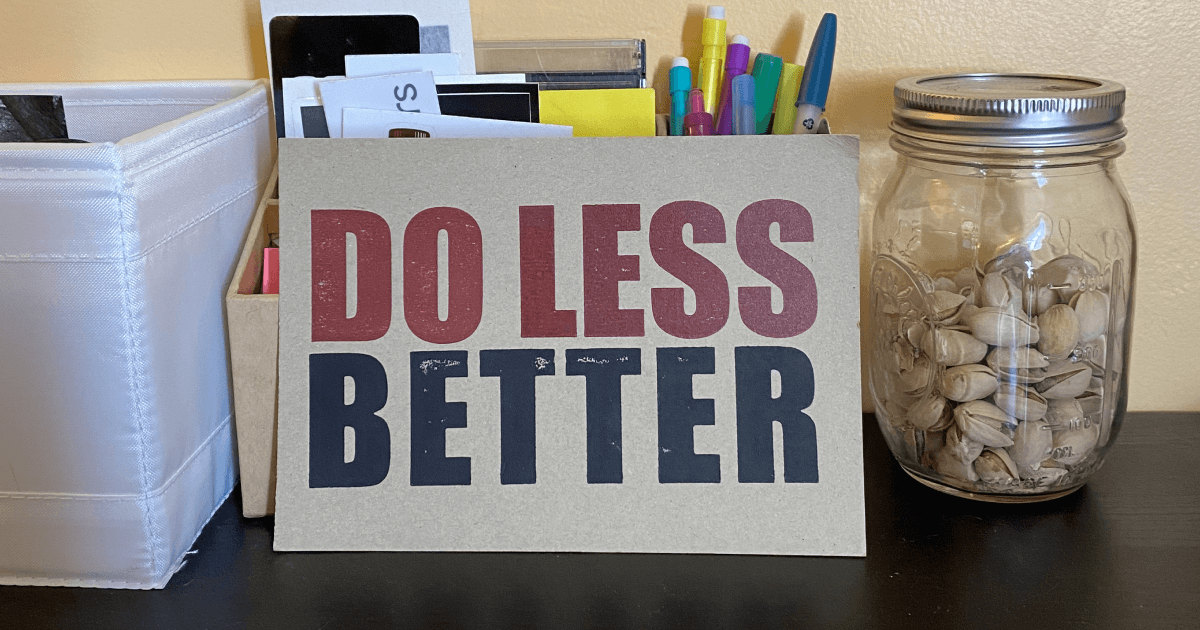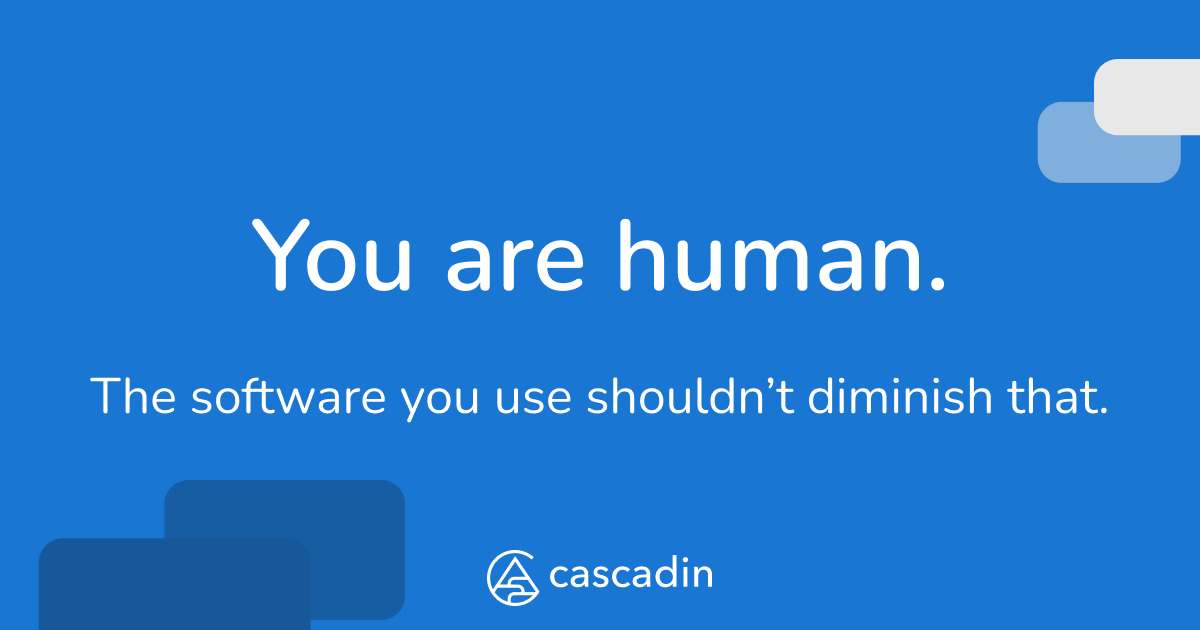Do less, better, means being human

We’ve had this placard for a long time. It sits in our office. When we first launched our beta of Cascadin, we used it in our launch photo. Yet, it took until this winter to understand and embrace what ‘do less, better’ means to us and why it’s about being human.
Jake and I sat down recently to talk about our new philosophy. You can watch the seven-minute conversation on YouTube.
Through the editing process, I realized that there was a lot left to be said.
Do less, better is more than what a software tool can provide.
The reality is that while I do truly believe we’re providing a tool that can help you ‘do less, better,’ there are systemic issues that need to be addressed.
What do I mean by systemic issues?
I mean a full societal reimagining of what it means to be productive. And what it means to be human.
As I’ve discussed, I’m finding more conversation around burnout, anti-hustle culture, and what our societal drive to be constantly productive is doing to us. An example of this is this recent article from Liz Fosslien and Mollie West Duffy about creating systems for support rather than relying on individuals to be resilient.
You, as an individual, can shift your mindset about work and productivity. Maybe you’ll find an organizing tool like Cascadin that helps you track and record what you’re doing simply, so you spend less time in the tool and more time doing those things. You may even have the privilege to change jobs and find a better fit for your new mindset.
It’s more than individuals doing less, better, though.
Fosslien and West Duffy argue that it is structural support, rather than only individual resilience, that combats burnout and mental health struggles.
“As the past few years have proved, uncertainty and challenging situations are often beyond our control. But how leaders respond — that is, whether they make work a place where employees feel supported, or push them until they burn out and give up — is not.”
Liz Fosslien and Mollie West Duffy
They give five ways that an organization, a team, can build better support into their culture, and I appreciate each one. Some of them even fit well with how Cascadin functions (#2 – Look back at how far you’ve come as a team.)
It’s also not about one tool or one company.
I would take Fosslien and West Duffy’s argument further than the workplace. Yes, individual companies need to foster better environments that support their workforce, not add to the problem. But, it’s also about the broader culture and society we live in.
If you haven’t yet read Can’t Even: How Millennials Became The Burnout Generation by Anne Helen Peterson, I highly recommend it.
“For years, Americans have resigned themselves to burnout…We work harder for less, and blame our fatigue and precarity on our own failings instead of society’s. But refusal to address burnout has consequences – on the individual, of course, but also on our country as a whole.”
Anne Helen Peterson
Peterson’s conclusion shaped my understanding of what is happening to our society and what to do about it. And I’ll follow her lead and not offer a list of to-dos to change this.
“You can’t optimize yourself to beat it, or work harder to make it go away faster.”
Anne Helen Peterson
Because it’s not only about one person, one software tool, or one company. It’s about collectively saying, “This is not okay. It doesn’t have to be this way.” And then looking for and implementing societal solutions that help everyone, like New Mexico offering no-cost childcare to families making up to $111,000. Providing resources and support like this removes barriers to jobs (creates them too!) and reduces the financial strain of having a family. Solutions like this help each of us reclaim our lives and help us get back to being human.
As corny as it sounds…
Jake and I are privileged enough that we can pursue this dream of a small business supporting individuals and small teams. We’ve been able to keep this going despite launching in a global pandemic and then losing momentum. We’re working on gaining that momentum back because we believe in doing less, better, and want to help you do the same.
As we discussed, Cascadin is designed to NOT contribute to the noise and stress of the world. It doesn’t scream at you that you’re not doing something.* It’s designed to be a tool, not a drain on your time or energy.
Cascadin gives you space to be human.
This, for me, is the point of these conversations around burnout, stress, productivity, and collective action and support. You and I are human. The software you use, the company you work for, and the society you live in, shouldn’t take that away.

*We recognize that some people might need a tool that does have more notifications. We’ve had conversations with people, in particular those with ADD/ADHD, who need many reminders and notifications to stay on track. We see you. Right now, Cascadin may not be a good fit for you and your needs. We’d love to know more about your needs and how we might be able to meet them in the future.
Alyson Roberts
Co-Founder & CEO
Known for organizing the dirty dishes before cleaning them, Alyson is learning how to do less, better and helping others do the same. She loves exploring beautiful lands near and far, trying new recipes, aspiring to be the next Star Baker, growing her garden, and avoiding board games at all cost.